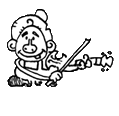My quest as a music teacher is to understand help people practice better. Not only is this the key to becoming a successful musician, but it effects other behaviors and habits in your life.
In Charles Duhigg’s book The Power Of Habit, he talks about “keystone habits”. These are healthy habits that have a ripple effect on other habits and aspects of your life. When you establish a good keystone habit, other good habits follow.
- Keystone habit: daily exercise. Do this and you are more likely to fall into the habit of eating healthier food.
- Keystone habit: don’t take work home with you. If you can set healthy work boundaries then you improve the quality of the relationships you have with others.
- Keystone habit: practice fiddle every day. Do this and you might end up living more frugally and saving money. Why? Because you’re having fun doing something you love and so you don’t need to fill that void with consumerism, buying things that ultimately bring you no lasting happiness.
I firmly believe that consistent and productive practice is the most important goal, even if you’re playing in the New York Philharmonic. Learning how to practice is a lifelong adventure. For example, I have noticed that when I practice I quickly get a sore back and neck, but when I play shows, I never seem to have this problem. I think it’s because during the shows I’m moving around, dancing, even jumping.
And so when practicing at home, I’m now making a conscious effort to move more as well as take breaks for stretching and breathing.
It sounds like I’m talking a lot about the rewards of establishing music as a keystone habit. But just how do you do that? Here are some simple practices to get you going:
Don’t break the chain. In this article I talk about how you can use a wall calendar to easily track your practice. This old-school method has a built-in reward: you feel satisfaction as you see a string of X’s grow.
How to practice consistently. In this article I offer other tricks for establishing regular practice.
How to track your practice. Use journaling to track and understand the way you practice. You can use an online practice journal or an old-school paper journal. I’m constantly experimenting with both. Sometimes I like tracking my practice with evernote and sometimes it feels right just writing a few notes in a paper journal.
Be your own teacher. When I encounter successful students (success being defined as playing every day and enjoying it) I always ask them things like “How do you practice? What’s your routine? How to you deal with technical problems? Are there days when you just don’t feel like playing? If so, what do you do?” And I ask the same questions of the students who are struggling. If you ask yourself the same questions, then you are in effect being your own teacher. You can do this on your own even if you have a good teacher.
But how do you make fiddling a keystone habit? If you have discovered some hack that has helped you, please share with us in a comment below.


The last couple of weeks I’ve been pretty sad so though I’m practicing it seems pretty lackluster and doesn’t sound lovely. So one of the things I’m doing is just free practicing with drones. Sometimes tunes or parts of tunes or scales or just making up phrases that sound nice. I think just freeing myself for now from the expectation of correctly playing of a tune is right for this period of time and still exercises fingers, bowing and playing by ear. Thanks Jason for encouraging us👍🏽
From someone from the Keystone State, thank you for this article on keystone habits. One thing I do to try and make practice a keystone habit is to keep my fiddles close. I practice in my home office. I keep one fiddle in a display case above my desk so it is always visible and easily accessible, and the other on a violin hanger on the side of the bookshelf behind my office chair. No matter which way I turn, I always see one of my two fiddles. This has helped me. I can pick up the fiddle at anytime and practice a bit, and often do throughout the day.
In your sight, in your mind! Wonderful that you are so focused and close to your practice??
hi Jason’s
, english is not my mothertongue .. first of all i wish to undestand the real synonim of ” drone scales or playing or whatever attached to the Drone word ..”
second ,full understand your system of work that it looks quite logic and similar to my point of wiew
everyday practice is a goal
unfortunately not always possible as , i guess , neurones have to adapt to the inputs,assimilate or otherwise after a while is the reject the little burn out .. of course it is always relative to our age ..
teke care theo